| | | | | | | | | | | Axios World | | By Dave Lawler · Apr 18, 2022 | | Welcome back to Axios World. - Tonight's edition (1,987 words, 7 1⁄2 minutes) starts in the Solomon Islands, with a story reported along with my colleagues Bethany Allen-Ebrahimian and Zach Basu.
New arrival? Subscribe. | | | | | | 1 big thing: The unlikely epicenter of U.S.-China competition | 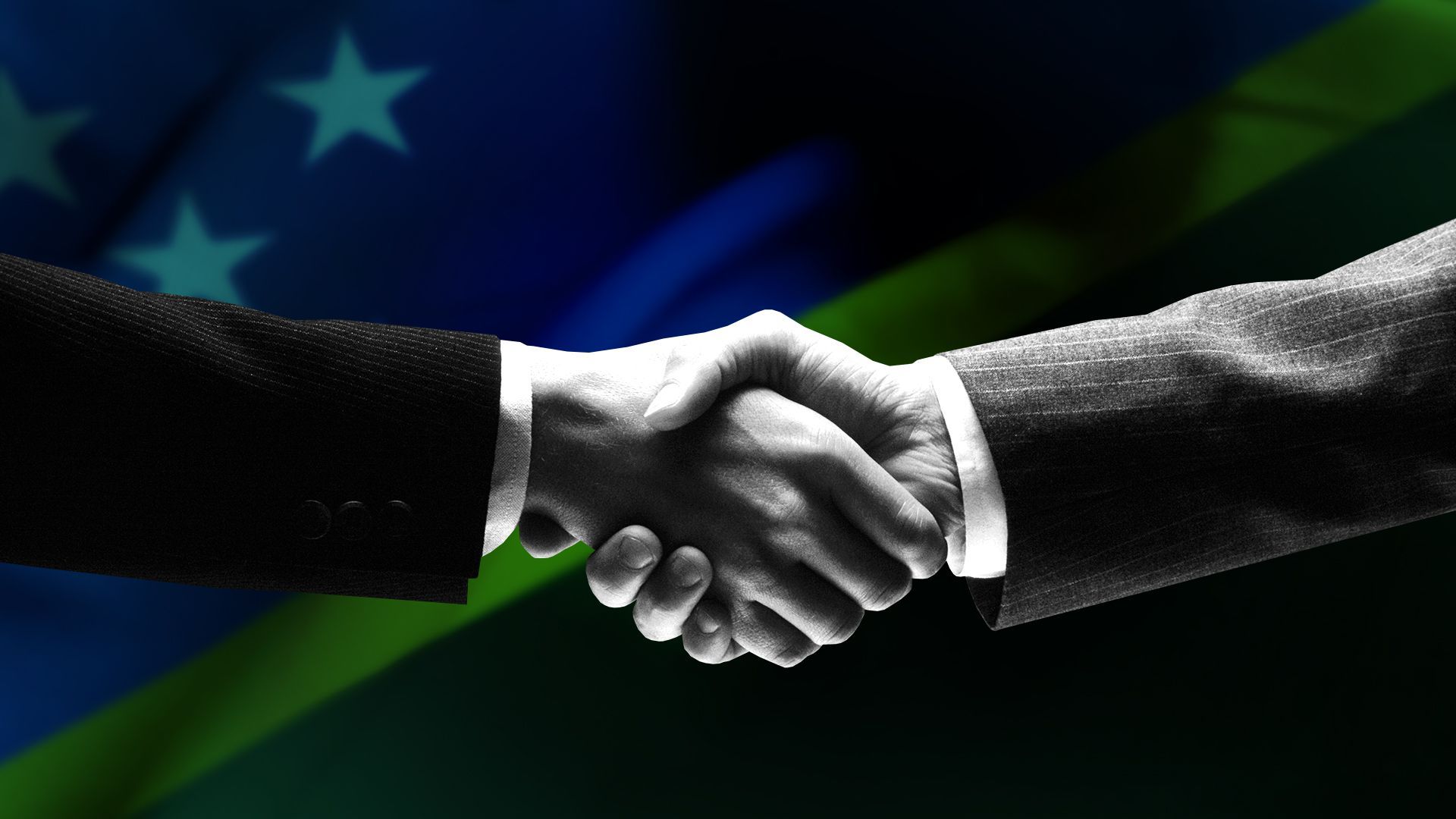 | | | Illustration: Annelise Capossela/Axios | | | | A U.S. delegation led by the top White House and State Department officials for Asia is heading this week to the Solomon Islands, a South Pacific archipelago with fewer than 700,000 inhabitants that has unexpectedly become ground zero for U.S.-China competition. Why it matters: A security agreement negotiated with Beijing, which could allow China's navy to dock warships on the islands, sent the U.S. and its allies in Australia and New Zealand into diplomatic hyperdrive. - The U.S. officials heading to the islands will make the case that the U.S., not China, "can provide security, prosperity and peace for the region," an administration official tells Axios.
Driving the news: According to a draft agreement that began circulating online last month, the Solomon Islands could request Chinese security forces to restore "social order." Once on the islands, they'd also have the authority to "protect the safety of Chinese personnel and major projects." - Senior U.S. officials have been placing calls to Honiara, the capital, and the State Department and Pentagon have issued warnings about the "export" of China's security forces and the "concerning precedent" for the region.
- Rumblings of a deal came just weeks after Secretary of State Tony Blinken announced in February that the U.S. would be opening an embassy in Honiara to increase engagement with the islands.
Australian Prime Minister Scott Morrison dispatched a senior diplomat to the islands and described the pending deal as a "great concern," with New Zealand echoing that sentiment. - Between the lines: The deal could both see Chinese naval vessels docking about 1,250 miles to the northeast of Australia and signal that Canberra's traditional influence in the South Pacific is waning.
But Solomon Islands Prime Minister Manasseh Sogavare rejected the "very insulting" suggestions that his country was "unfit to manage our sovereign affairs." - He has said the Solomon Islands won't allow China to build a military base, but is "diversifying" its security partnerships.
- He recently told parliament he's prepared to sign the deal, per WSJ.
- U.S. officials, led by White House Indo-Pacific coordinator Kurt Campbell and assistant secretary of state for East Asian and Pacific Affairs Daniel Kritenbrink, will try to change his mind. Accompanied by USAID, they'll "be talking about a range of ways to offer assistance in the region," the administration official said.
|     | | | | | | Part II: How we got here | 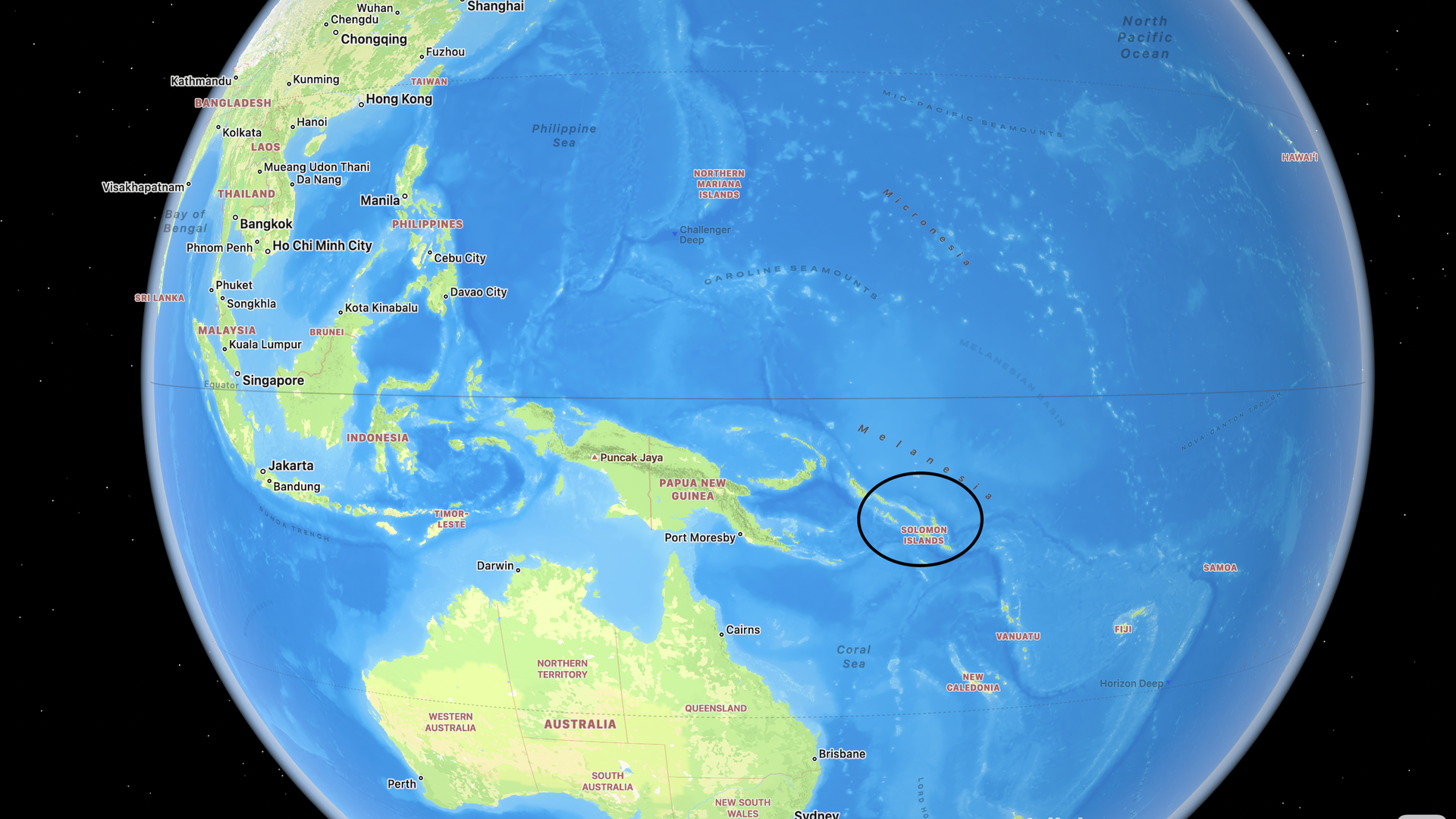 | | | Screenshot via Apple Maps | | | | Matt Pottinger, the top Asia expert on Donald Trump's National Security Council, visited the Solomon Islands in March 2019 amid concerns that the small nation — one of Taiwan's few remaining diplomatic partners — might soon switch allegiance to China. - Despite a diplomatic push from Washington, the islands cut ties with Taiwan in September 2019.
The U.S. must be "very, very active" in the Pacific islands region, Pottinger told Axios on Monday. "U.S. and Australian policy toward the Pacific can't fly on autopilot when the competition is as far along as it is, when China is so focused on military basing and influence and intelligence-gathering in that region." - Pottinger said that if China establishes bases across the Pacific, it could threaten U.S. supply lines in the event of war.
Marine Corps Commandant Gen. David Berger noted last week on a trip to Australia that the geographical location of the Solomon Islands was important during World War II — when a crucial battle was fought on Guadalcanal, the archipelago's largest island — and remains so today. - He also warned that the security pact was "too good to be true" for the islands and would come with strings attached.
- China's Foreign Ministry spokesperson said last month that countries that have long sent "military aircraft and vessels right to others' doorsteps" should not "condescendingly" object to such "mutually beneficial cooperation."
The backstory: Relations with China are contentious within the islands themselves. - The provincial government on the most populous island, Malaita, defied Sogavare in 2019 by maintaining links with Taiwan. The U.S. controversially promised Malaita $35 million in direct U.S. aid in 2020.
- When protesters from Malaita attempted to storm parliament last November, Sogavare blamed "deliberate lies" about the diplomatic switch from China to Taiwan and meddling from "outside powers."
What to watch: The "vague" language in the draft agreement could play to Beijing's advantage, according to Charles Edel, Australia chair at the Center for Strategic and International Studies. |     | | | | | | 3. Macron's struggles with young voters leave opening for Le Pen | 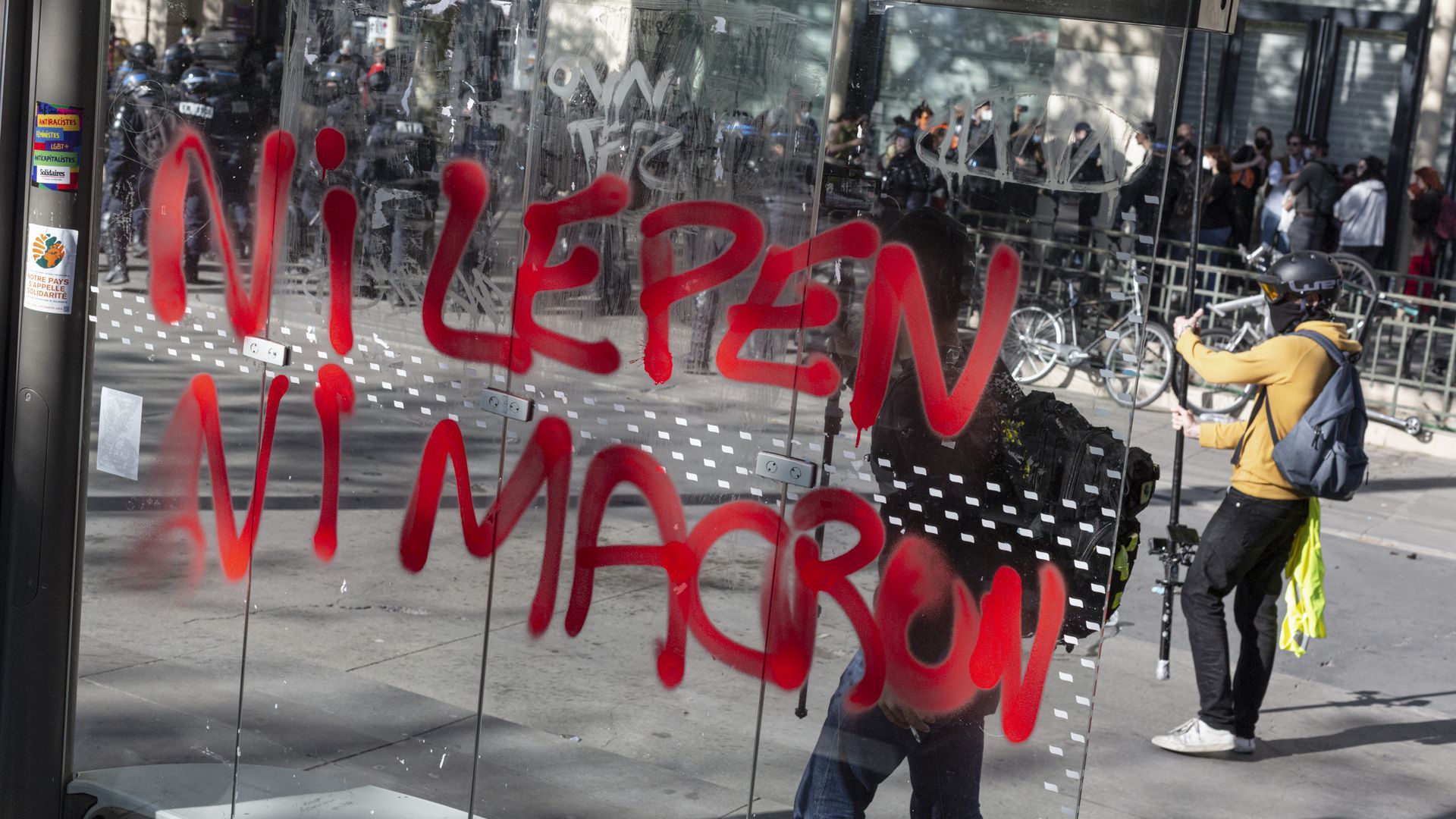 | | | Graffiti reads "Neither Macron nor Le Pen" as protesters demonstrate on April 16 in Paris. Photo: Sam Tarling/Getty Images | | | | France's April 24 presidential runoff between President Emmanuel Macron and far-right leader Marine Le Pen could be decided by young voters, many of whom oppose both candidates, Axios' Ivana Saric writes. Driving the news: In the first round, Le Pen and far-left candidate Jean-Luc Mélenchon outpaced Macron among voters under 35, according to data from Harris Interactive. - Mélenchon, who finished third overall, won among under 25-year-olds, while Le Pen won among voters 25–34 (with Macron a distant third in that category). Meanwhile, Macron doubled Le Pen's tally among voters over 65.
- Between the lines: Older voters were the driving force behind Brexit and the rise of Donald Trump, but in France — at least in the first round — support for the far right was highest among 25- to 34-year-olds.
The big picture: Le Pen's focus on cost-of-living issues and her softer campaign style this time around has boosted her appeal among young people, Susi Dennison, director of the European power program at the European Council on Foreign Relations, told Axios. - In 2017, Le Pen was "quite visibly a far-right candidate," Dennison said. "She was campaigning on immigration and identity issues. That's all still there — if you read her program, if you compare it — but it's not what she's been talking about."
- Meanwhile, Macron's political movement represented hope for change in 2017, but many younger voters are disillusioned and feel his "social justice agenda hasn't amounted to anything," according to Dennison.
Yes, but: Getting young people to turn out will be a hurdle. While the overall abstention rate in the first round was about 26%, it was over 40% among under-35s, per Politico. - Last week, large student demonstrations erupted at several universities in Paris, with students making clear their dislike for both Macron and Le Pen, AP reported.
What to watch: Macron and Le Pen will face off in a television debate on April 20. Macron leads 54% to Le Pen's 46% in Politico's Poll of Polls. |     | | | | | | A message from Axios | | Every deal, every development, every day | | |  | | | | Axios Pro delivers deeper reporting and analysis as fast as you need it. Who it's for: If you care about VC, PE, M&A, IPOs, SPACs, or just need the latest industry scoops, Axios Pro is for you. Use code PRO200 at checkout to get $200 off your subscription. | | | | | | Bonus: Where in the world? | | Today we're visiting some of the biggest cities in Africa. I'll name the city, you name the country: - Kinshasa
- Lagos
- Cairo
- Dar es Salaam
- Khartoum
- Johannesburg
- Abidjan
- Nairobi
- Accra
- Casablanca
- Douala
- Kampala
- Addis Ababa
- Dakar
- Mogadishu
- Tripoli
Scroll to the bottom for the answers. |     | | | | | | 4. Zelensky says Russia's Donbas offensive has started |  Ukrainian President Volodymyr Zelensky announced Monday that Russia's long-awaited offensive in the Donbas region had begun, setting off a decisive second phase of the war centered on a battle for territory in eastern Ukraine, Zach writes. Driving the news: Heavy shelling was reported Monday alongside nearly the entirety of the 300-mile front line, including the Kharkiv, Donetsk and Luhansk regions, according to Oleksiy Danilov, the secretary of Ukraine's National Security and Defense Council. - Russia claimed it hit hundreds of military supply targets around Ukraine in anticipation of the offensive, including in the western city of Lviv, where at least seven people were killed in missile strikes early Monday.
- In besieged Mariupol, the third-largest city in the Donbas, the last remaining Ukrainian forces were still holding out in a fortress-like steel plant under heavy bombardment from Russia.
- A senior U.S. defense official told reporters Monday that fully capturing Mariupol would allow Russia to free up 12 battalion tactical groups — units generally made up of 700–900 soldiers each — to be deployed elsewhere.
Go deeper. |     | | | | | | 5. Lunch with Bill Browder | 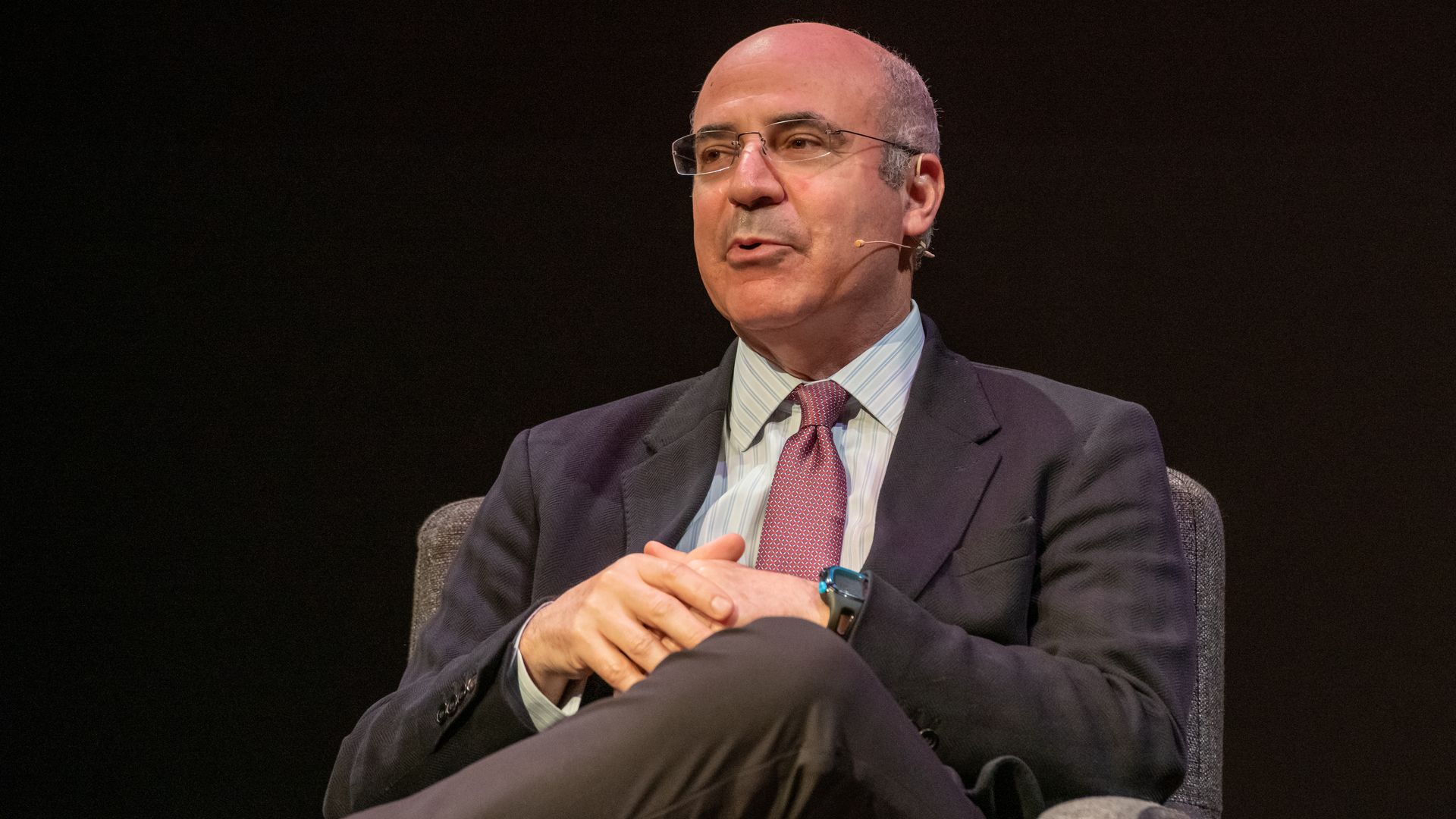 | | | Browder in 2019. Photo: Julia Reinhart/Getty Images | | | | Bill Browder, the financier turned human rights activist and top Putin foe, was in D.C. on Friday to promote the sequel to his 2015 bestseller, "Red Notice." Over lunch at a Capitol Hill steakhouse, Browder explained to four journalists (including Axios) that he sees the war in Ukraine as a balance sheet: - It's costing Putin perhaps $1 billion per day (a rough number).
- To fund it, Putin can tap oil and gas sales, Kremlin reserves (much of which are frozen), and assets he holds indirectly, through oligarchs.
What he's saying: "The rule of thumb is that 50% of oligarch money is Putin's money and 100% is Putin's money if he needs it," Browder says. - When jurisdictions from Jersey to Switzerland freeze an oligarch's assets, particularly their cash, they are depriving Putin of money he could use to finance the war, Browder argues.
Browder doesn't think Putin will end the war simply because it's getting too expensive, arguing that Putin is "ready to starve his own people" and has never once compromised when under pressure ("he just escalates"). - Browder rejects the idea that sanctions and war losses will generate pressure on Putin from within the elite, arguing that view stems from a fundamental misunderstanding of where power lies in Moscow.
- Thus, he thinks the focus should be on restricting Putin's cashflow so he can't wage war effectively as the fighting drags on.
Browder also recounted an argument with Russian opposition politician Vladimir Kara-Murza over dinner in London the night before Kara-Murza returned to Moscow. - Kara-Murza, who previously survived two apparent assassination attempts, said he couldn't call on Russians rise up against Putin if he wasn't willing to return home. Browder pleaded with him not to go.
- After returning, Kara-Murza called the Russian government "a regime of murderers" in a CNN interview and was almost immediately arrested on Orwellian charges of attempting to evade arrest.
Go deeper: Kara-Murza described that arrest through his lawyers in a Washington Post column. |     | | | | | | 6. What I'm reading: Weekend reads | 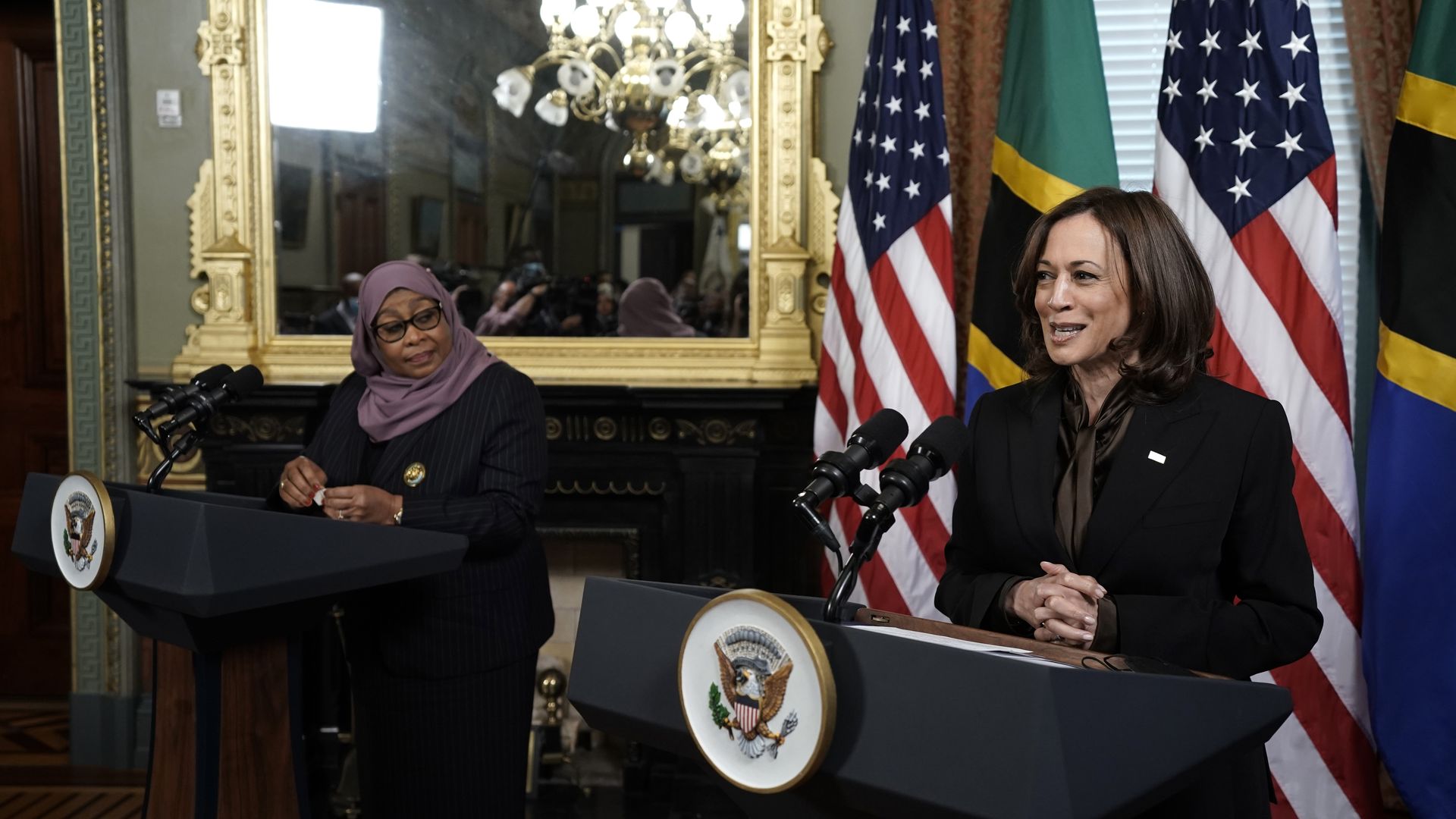 | | | Tanzania President Samia Suluhu Hassan meets with Vice President Harris on Friday in Washington. Photo: Yuri Gripas/Abaca/Bloomberg via Getty | | | | 1. The generation that "built Japan into the world's third-largest economy" is hitting retirement age — without a new generation anxious to take on their family-owned firms, a Financial Times longread finds. - "Japan faces what some fear could be the most extensive evaporation of knowhow and institutional memory in modern history."
- Attempts to avoid that include "a 'dating app'-style system designed to match heirless company owners with the sons and daughters they never had."
2. The primary author of Zelensky's viral video addresses is "a 38-year-old former journalist and political analyst with fewer than 200 followers on Twitter," The Guardian's Luke Harding writes. - Many of his co-authors have used their TV experience to great effect, working with Zelensky to craft a nightly narrative of "light versus darkness."
3. President Samia Suluhu Hassan of Tanzania, who met with Vice President Harris on Friday, comes across in an NYT interview as a reformer, but a very cautious one. - What she's saying: "Most of the people couldn't believe that we can have a woman president and she can deliver," said Hassan, who replaced the late strongman John Magufuli last March.
4. India is pressuring the WHO not to publish its estimate that around 15 million people died of COVID by the end of 2021, according to the NYT, building on reporting from Devex. - The reason: It concludes that 4 million died in India, nearly eight times the official count.
5. Yemeni President Abed Rabbo Mansour Hadi is "effectively under house arrest" in Riyadh after resigning on April 7, a Saudi official told the WSJ. - Per the Journal, Saudi Crown Prince Mohammed bin Salman presented him "with a written decree delegating his powers."
|     | | | | | | 7. Stories we're watching |  | | | Moonrise over the windmills of Toledo, Spain. Photo: Marcos del Mazo/LightRocket via Getty | | | - COVID in China: Deaths in Shanghai; U.S. says zero COVID will fail
- Ukraine latest: New strikes in Lviv and Kyiv; Putin honors Bucha brigade; Ukraine sunk flagship; Ukraine seeks debt help; Zelensky expects Biden visit; Hunger as a weapon
- $620 million crypto theft linked to North Korea
- Over 150 Palestinians injured as Israeli police raid al-Aqsa Mosque
- Death toll rises to 443 after South African storm
- Quran-burning plans trigger unrest in Sweden
- Japanese baseball phenom throws 17 perfect innings
Quoted: "Yes, I very much want us to be like China. I dream about us being like China." — Margarita Simonyan, Russian propagandist and RT chief, on her "dream" of greater censorship of the internet and media in Russia |     | | | | | | A message from Axios | | Every deal, every development, every day | | |  | | | | Axios Pro delivers deeper reporting and analysis as fast as you need it. Who it's for: If you care about VC, PE, M&A, IPOs, SPACs, or just need the latest industry scoops, Axios Pro is for you. Use code PRO200 at checkout to get $200 off your subscription. | | | | Answers: 1. Democratic Republic of Congo; 2. Nigeria; 3. Egypt; 4. Tanzania; 5. Sudan; 6. South Africa; 7. Cote d'Ivoire (Ivory Coast); 8. Kenya; 9. Ghana; 10. Morocco; 11. Cameroon; 12. Uganda; 13. Ethiopia; 14. Senegal; 15. Somalia 16. Libya Questions: 1. Kinshasa; 2. Lagos; 3. Cairo; 4. Dar es Salaam; 5. Khartoum; 6. Johannesburg; 7. Abidjan; 8. Nairobi; 9. Accra; 10. Casablanca; 11. Douala; 12. Kampala; 13. Addis Ababa; 14. Dakar; 15. Mogadishu; 16. Tripoli |  | It's called Smart Brevity®. Over 200 orgs use it — in a tool called Axios HQ — to drive productivity with clearer workplace communications. | | | | | | Axios thanks our partners for supporting our newsletters. If you're interested in advertising, learn more here.
Sponsorship has no influence on editorial content. Axios, 3100 Clarendon Blvd, Suite 1300, Arlington VA 22201 | | | You received this email because you signed up for newsletters from Axios.
Change your preferences or unsubscribe here. | | | Was this email forwarded to you?
Sign up now to get Axios in your inbox. | | | | Follow Axios on social media:    | | | | | |












No comments:
Post a Comment